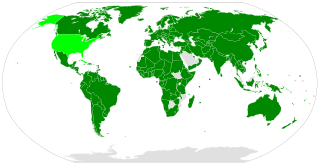
The Convention on Biological Diversity (CBD), known informally as the Biodiversity Convention, is a multilateral treaty. The Convention has three main goals: the conservation of biological diversity ; the sustainable use of its components; and the fair and equitable sharing of benefits arising from genetic resources. Its objective is to develop national strategies for the conservation and sustainable use of biological diversity, and it is often seen as the key document regarding sustainable development.
The Treaty on the Protection of Artistic and Scientific Institutions and Historic Monuments or Roerich Pact is an inter-American treaty. The most important idea of the Roerich Pact is the legal recognition that the defense of cultural objects is more important than the use or destruction of that culture for military purposes, and the protection of culture always has precedence over any military necessity.

The Outer Space Treaty, formally the Treaty on Principles Governing the Activities of States in the Exploration and Use of Outer Space, including the Moon and Other Celestial Bodies, is a multilateral treaty that forms the basis of international space law. Negotiated and drafted under the auspices of the United Nations, it was opened for signature in the United States, the United Kingdom, and the Soviet Union on 27 January 1967, entering into force on 10 October 1967. As of August 2023, 114 countries are parties to the treaty—including all major spacefaring nations—and another 22 are signatories.

The Treaty for the Prohibition of Nuclear Weapons in Latin America and the Caribbean is an international treaty that establishes the denuclearization of Latin America and the Caribbean. It was proposed by Adolfo López Mateos, the President of Mexico, and promoted by the Mexican diplomats Alfonso García Robles, Ismael Moreno Pino and Jorge Castañeda as a response to the Cuban Missile Crisis (1962). For his efforts in favor of the reduction of nuclear weapons, García Robles was awarded the Nobel Peace Prize in 1982.

The Convention on the Prevention of Marine Pollution by Dumping of Wastes and Other Matter 1972, commonly called the "London Convention" or "LC '72" and also abbreviated as Marine Dumping, is an agreement to control pollution of the sea by dumping and to encourage regional agreements supplementary to the convention. It covers the deliberate disposal at sea of wastes or other matter from vessels, aircraft, and platforms. It does not cover discharges from land-based sources such as pipes and outfalls, wastes generated incidental to normal operation of vessels, or placement of materials for purposes other than mere disposal, providing such disposal is not contrary to aims of the convention. It entered into force in 1975. As of September 2016, there were 89 Parties to the convention.

The International Covenant on Economic, Social and Cultural Rights (ICESCR) is a multilateral treaty adopted by the United Nations General Assembly (GA) on 16 December 1966 through GA. Resolution 2200A (XXI), and came into force on 3 January 1976. It commits its parties to work toward the granting of economic, social, and cultural rights (ESCR) to all individuals including those living in Non-Self-Governing and Trust Territories. The rights include labour rights, the right to health, the right to education, and the right to an adequate standard of living. As of July 2020, the Covenant has 171 parties. A further four countries, including the United States, have signed but not ratified the Covenant.

The Protocol Amending the Agreements, Conventions and Protocols on Narcotic Drugs concluded at The Hague on 23 January 1912, at Geneva on 11 February 1925 and 19 February 1925, and 13 July 1931, at Bangkok on 27 November 1931 and at Geneva on 26 June 1936 was a treaty, signed on 11 December 1946 at Lake Success, that shifted the drug control functions previously assigned to the League of Nations to the United Nations. As the Protocol's official title says, it modifies the provisions of the:
Economic, social and cultural rights (ESCR) are socio-economic human rights, such as the right to education, right to housing, right to an adequate standard of living, right to health, victims' rights and the right to science and culture. Economic, social and cultural rights are recognised and protected in international and regional human rights instruments. Member states have a legal obligation to respect, protect and fulfil economic, social and cultural rights and are expected to take "progressive action" towards their fulfilment.

The Hague Convention for the Protection of Cultural Property in the Event of Armed Conflict is the first international treaty that focuses exclusively on the protection of cultural property in armed conflict. It was signed at The Hague, Netherlands, on 14 May 1954 and entered into force on 7 August 1956. As of July 2021, it has been ratified by 133 states.

The World Digital Library (WDL) is an international digital library operated by UNESCO and the United States Library of Congress.

The Cape Town Convention on International Interests in Mobile Equipment, or Cape Town Treaty is an international treaty intended to standardize transactions involving movable property. The treaty creates international standards for registration of contracts of sale, security interests (liens), leases and conditional sales contracts, and various legal remedies for default in financing agreements, including repossession and the effect of particular states' bankruptcy laws.

The ATA Carnet, often referred to as the "Passport for goods", is an international customs document that permits the tax-free and duty-free temporary export and import of nonperishable goods for up to one year. It consists of unified customs declaration forms which are prepared ready to use at every border crossing point. It is a globally accepted guarantee for customs duties and taxes which can replace the security deposit required by each customs authority. It can be used in multiple countries in multiple trips up to its one-year validity. The acronym ATA is a combination of French and English terms "Admission Temporaire/Temporary Admission". The ATA carnet is now the document most widely used by the business community for international operations involving temporary admission of goods.
The International Publishers Association is an international publishing industry federation of national publisher associations representing book and journal publishing, founded in 1896 in Paris. It is a non-profit and non-governmental organization, to promote and protect publishing and to raise awareness for publishing in the context of economic, cultural and political development. The IPA represents the interests of the publishing industry on an international level.

The World Heritage Convention, formally the Convention Concerning the Protection of the World Cultural and Natural Heritage, is an international treaty signed on 23 November 1972, which created the World Heritage Sites, with the primary goals of nature conservation and the preservation of cultural properties. The convention, a signed document of international agreement, guides the work of the World Heritage Committee. It was developed over a seven-year period (1965–1972).
Since 2008 copyright in Afghanistan has been governed by the law on the support the right of authors, composers, artists and researchers.

The UNESCO 1970 Convention on the Means of Prohibiting and Preventing the Illicit Import, Export and Transfer of Ownership of Cultural Property is an international treaty to combat the illegal trade in cultural items. It was signed on 14 November 1970 and came into effect on 24 April 1972. As of October 2022, 142 states have ratified the treaty.

The Protocol Against the Illicit Manufacturing and Trafficking in Firearms, Their Parts and Components and Ammunition is a treaty on anti-arms trafficking including Small Arms and Light Weapons that is supplemental to the Convention against Transnational Organized Crime. It is one of the so-called Palermo protocols.
The Convention for the Suppression of Unlawful Acts against the Safety of Civil Aviation is a multilateral treaty by which states agree to prohibit and punish behaviour which may threaten the safety of civil aviation.
The Convention for the Suppression of the Circulation of and Traffic in Obscene Publications is a 1923 League of Nations anti-pornography treaty that was initially negotiated and concluded in Geneva. It was amended by a 1947 Protocol and as of 2013 has 56 state parties.
The International Convention to Facilitate the Importation of Commercial Samples and Advertising Material is a 1952 United Nations multilateral treaty. States that ratify the treaty agree to allow product samples and advertising material into the county duty-free.